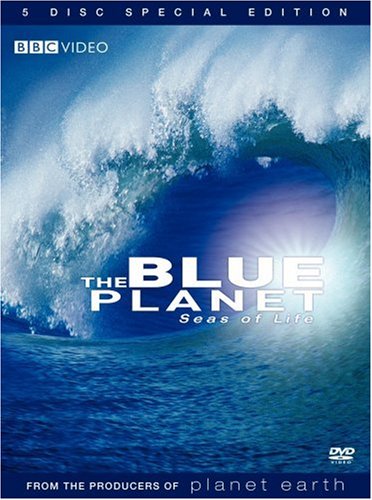The Blue Planet BBC Series
The Blue Planet is a documentary series released in 2001 by the BBC. Each of the 50-minute episodes covers a different aspect of marine life.
There are a total of 8 episodes of Blue Planet. The worksheets and student guides I have written for this series are all based on the BBC version starring David Attenborough as the narrator. I have not written anything for the first episode entitled "The Blue Planet", as it is largely a recap of the other episodes.
Each episode provides a tremendous opportunity for "teachable moments." Whether your focus is biology, earth science, or ecology, there is a good chance your concepts are covered by one more more of these episodes.
Tip for teachers: Use closed captioning! Many of the animals and plants have very unusual names with very unusual spellings! Seeing them in text makes it much easier for the students to follow!
Blue Planet - The Deep
Key Concepts: Oceanic zones, euphotic zone, disphotic zone, aphotic zone, photosynthesis, chemosynthesis, adaptation, camouflage.
Teachable Moments: The entire nature of the oceanic ecosystem changes as one travels deeper and deeper into the abyss. Temperatures drop, pressure increases, and sunlight fades away. This is a great opportunity to show how these factors drastically impact the biodiversity found within each oceanic zone.
Blue Planet - Open Ocean
Key Concepts: Open ocean, aquatic ecosystems, euphotic zone, adaptations.
Teachable Moments: The open ocean is often referred to as a "marine desert." This may seem contradictory to students, who perceive a desert as a hot, dry, sandy ecosystem. However, the biodiversity in the open ocean, away from the flow of nutrients from the coasts, is the lowest for all aquatic ecosystems.
Blue Planet - Seasonal Seas
Key Concepts: Seasons, latitude, aquatic ecosystems, migration, photosynthesis, plankton, food webs, food chains, keystone species.
Teachable Moments: The concept of seasons is typically only associated with land ecosystems within temperate latitudes. However, oceans within these latitudes also experiences changes. Water, having a high specific heat, does not have the wide range of temperatures that air does throughout the year, but it can still vary in ways that affect the biodiversity present.
Blue Planet - Coral Seas
Key Concepts: Coral reefs, aquatic ecosystems, coral polyps, biodiversity, food webs, symbiosis, interspecies relationships, parasitism, mutualism, commensalism, competition, predation.
Teachable Moments: Of all the oceanic ecosystems, the coral reefs boast the greatest biological diversity and complexity. Students will observe multiple types of interspecies relationships in this episode, ranging from competition to mutualism.
Blue Planet - Tidal Seas
Key Concepts: Tides, gravity, tidal bore, equinox, aquatic ecosystems, adaptations.
Teachable Moments: The movement of the tides produces very ecologically diverse ecosystems. Animals, plants, and protists from both land and sea converge on this area. The land species will be adapted for taking advantage of the tide, gathering food quickly, and swimming. The aquatic species will be adapted for surviving the threat of dessication during low tide.
Blue Planet - Coasts
Key Concepts: Coastal ecosystems, migration, breeding, seabirds, adaptations.
Teachable Moments: This is the only episode of the Blue Planet series that focuses on land-based life. The dynamics of each of the ecosystems shown in this episode revolve around the nearby ocean. All animals are adapted for hunting or somehow gathering food from the sea itself.


